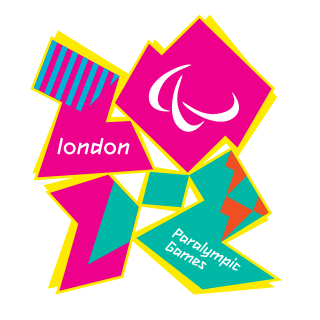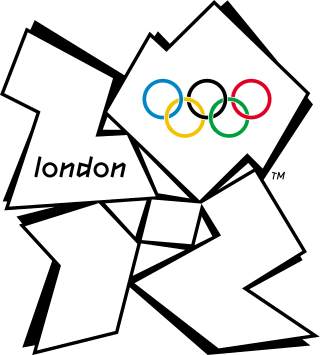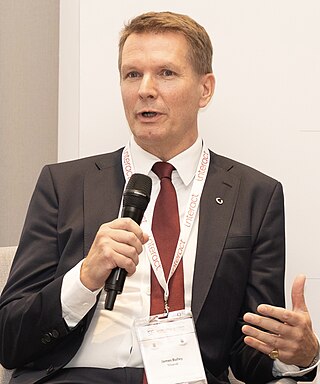
The Department for Culture, Media and Sport (DCMS) is a ministerial department of the Government of the United Kingdom. It holds the responsibility for culture and sport in England, and some aspects of the media throughout the UK, such as broadcasting. Its main offices are at 100 Parliament Street, occupying part of the building known as Government Offices Great George Street.

The 2012 Summer Paralympics, branded as the London 2012 Paralympic Games, were an international multi-sport parasports event held from 29 August to 9 September 2012 in London, England, United Kingdom. They were the 14th Summer Paralympic Games as organised by the International Paralympic Committee (IPC).
Sir Robert Andrew "Robin" Wales is a British Labour Party politician who served as Mayor of Newham from 2002 to 2018. Prior to taking up that newly created role, he was leader of Newham council since 1995, having been a councillor from 1982 to 1986 and 1992 to 2002.

London 2012 was the successful bid to host the 2012 Summer Olympics, held in London with most events taking place in Stratford in the borough of Newham. The British Olympic Association had been working on the bid since 1997, and presented its report to government ministers in December 2000.

The 2012 Summer Olympics, officially the Games of the XXX Olympiad and also known as London 2012, were an international multi-sport event held from 27 July to 12 August 2012 in London, England, United Kingdom. The first event, the group stage in women's football, began on 25 July at the Millennium Stadium in Cardiff, Wales, followed by the opening ceremony on 27 July. There were 10,518 athletes from 206 National Olympic Committees (NOCs) who participated in the 2012 Olympics.

The London Stadium is a multi-purpose outdoor stadium at Queen Elizabeth Olympic Park in the Stratford district of London. It is located in the Lower Lea Valley, 6 miles (10 km) east of central London. The stadium was constructed specifically for the 2012 Summer Olympics and 2012 Summer Paralympics, serving as the Athletics venue and as the site of their opening and closing ceremonies. Following the Games, it was renovated for multi-purpose use and now serves primarily as the home of Premier League club West Ham United, who played at the Boleyn Ground before moving to the stadium in 2016.

Queen Elizabeth Olympic Park is a sporting complex and public park in Stratford, Hackney Wick, Leyton and Bow, in east London. It was purpose-built for the 2012 Summer Olympics and Paralympics, situated adjacent to the Stratford City development. It contains the Olympic stadium, now known as the London Stadium, and the Olympic swimming pool together with the athletes' Olympic Village and several other Olympic sporting venues and the London Olympics Media Centre. The park is overlooked by the ArcelorMittal Orbit, an observation tower and Britain's largest piece of public art.
The 2012 Summer Olympic development process began in 2005, following the successful London bid for the 2012 Summer Olympics, and ran until the games in 2012. While many of the plans were included in the bid portfolio, which gained the favour of the International Olympic Committee (IOC) over the four other bids on 6 July 2005, there were more details released and decisions made afterwards. The London Organising Committee of the Olympic Games and Paralympic Games (LOCOG) was created to oversee many of these developments, though such a large-scale event requires the co-operation of many other agencies. These organizations are sometimes integral parts of the London 2012 plans, while others are unrelated but can still have a great effect.

The London Organising Committee of the Olympic and Paralympic Games (LOCOG) was the organisation responsible for overseeing the planning and development of the 2012 Summer Olympic and Paralympic Games. It was jointly established by the UK Government's Department for Culture, Media and Sport, the Mayor of London and the British Olympic Association and was structured as a private company limited by guarantee. LOCOG worked closely with the publicly funded Olympic Delivery Authority (ODA), which is responsible for the planning and construction of new venues and infrastructure.
The 2012 Summer Olympics and Paralympics venues were mostly located in the host city of London, though some other events required facilities located elsewhere. Between the successful bid and the Olympics and Paralympics themselves, several details and venues changed.

Paul Clive Deighton, Baron Deighton, KBE is a British Conservative politician who served as Commercial Secretary to HM Treasury from January 2013 to May 2015. Deighton is a former investment banker who previously served as Chief Executive of the London Organising Committee of the Olympic and Paralympic Games (LOCOG), the organisation responsible for planning the 2012 Summer Olympics and Paralympics.

Sir John Alexander Armitt is an English civil engineer, and current chairman of the UK's National Infrastructure Commission.

Manor Garden Allotments were allotment gardens occupying 4.5 acres (18,000 m2) between the River Lea and the Channelsea River in Hackney Wick, London, England. They are also sometimes referred to as Eastway Allotments, particularly in the 2012 Summer Olympics planning application documents. They were demolished to make way for the Olympic site. The site was formerly in the London Borough of Hackney, but after ward boundary changes in the 1990s the footprint sat within London Borough of Newham. At the time of eviction the site was owned by Lee Valley Regional Park Authority. The "Eastway Allotments" were known more locally as "Abbott's Shoot" or "Bully Fen".

The London 2012 Olympic Legacy is the longer-term benefits and effects of the planning, funding, building and staging of the Olympic and Paralympic Games in summer 2012. It is variously described as:

The ArcelorMittal Orbit is a 114.5-metre (376-foot) sculpture and observation tower in the Queen Elizabeth Olympic Park in Stratford, London. It is Britain's largest piece of public art, and is intended to be a permanent lasting legacy of London's hosting of the 2012 Summer Olympic and Paralympic Games, assisting in the post-Olympics regeneration of the Stratford area. Sited between the Olympic Stadium and the Aquatics Centre, it allows visitors to view the whole Olympic Park from two observation platforms.

Here East is a media complex located in the Olympic Park in East London, built specially for the 2012 London Olympics. It is located at the site of the former Hackney Wick Stadium close to the Riverbank Arena in Hackney Wick.

East Village is a housing development in Stratford, East London that was designed and constructed as the Olympic Village of the 2012 Summer Olympics and has been converted for use as a new residential district, complete with independent shops, bars and restaurants. The area was formerly contaminated waste land and industrial buildings to the north of Stratford town centre.

The London Legacy Development Corporation (LLDC) is an organisation established in 2012, replacing the Olympic Park Legacy Company and the planning powers of the Olympic Delivery Authority. It was formed as a mayoral development corporation under the powers of the Localism Act 2011. The mayoral development area covered by the development corporation is the Olympic Park and surrounding areas.
ISO 20121 is a voluntary international standard for sustainable event management, created by the International Organization for Standardization. The standard aims to help organizations improve sustainability throughout the entire event management cycle.

James Bulley OBE FRICS is a British businessman. He is the CEO and co-founder of Trivandi Ltd, and was previously the Director of Venues and Infrastructure of the London Organising Committee of the Olympic Games and Paralympic Games (LOCOG), the organisation responsible for planning and delivering the 2012 Summer Olympics and Paralympics.















